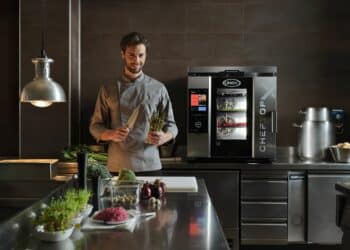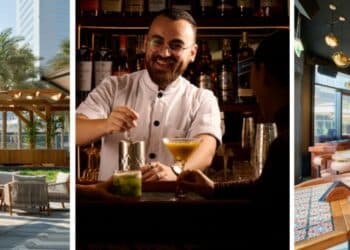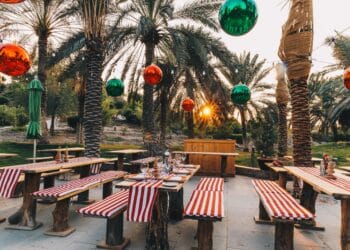Turkish restaurateur Umut Özkanca and chef Colin Clague introduce Rüya, Dubai’s first contemporary Anatolian restaurant, lounge and bar.

When most people think of Turkish cuisine, greasy kebabs and garlic mayonnaise spring to mind. However, second generation Turkish restaurateur and entrepreneur Umut Özkanca, and Colin Clague, previous head chef of Jean Georges Dubai, Qbara and Zuma in London and Dubai, are determined to change this with the opening of Rüya in Dubai’s Grosvenor House Hotel. The latest concept from d.ream Group, which is also a partner in Coya, Nusret and Zuma, Rüya is at the forefront of the Turkish culinary trend – the latest to hit the emirate – and already competitors are springing up, with the opening of Besh Turkish Kitchen at Sheraton Mall of the Emirates and Fish Beach Taverna, an Aegean-inspired eatery located on The Westin Dubai Mina Seyahi beach. Encouraging diners to throw out their preconceptions will be the challenge these pioneers face when introducing the market to real Anatolian cuisine.
“Turkey is the same size as France and Germany; it’s enormous and has influences from everywhere. It’s a bit of Middle Eastern, and to the North it’s a bit Hungarian then Ottoman” – Colin Clague
“Here you get donner kebab after a night out, but Turkish food is so not that,” explains Colin Clague, who has been working on the concept for the past four months. “The sheer size of the country, and the fact that there are dishes from more than 3,000 years ago means you can play around with it all day. That’s what attracted me to the concept – it’s about playing and creating. Turkey is the same size as France and Germany; it’s enormous and has influences from everywhere. It’s a bit of Middle Eastern, and to the North it’s a bit Hungarian then Ottoman.”

Özkanca, who operates 10 restaurants in Turkey, first encountered Clague during a visit to one of the chef’s previous places of work, Qbara, which specialised in new-age Arabic cuisine. “I was doing research on contemporary Middle Eastern cuisines but I couldn’t see any that impressed me. Then it was our last day in Dubai and I checked out Qbara, where I tasted the whole menu and thought it was something different, because the beginning of Middle Eastern food was there but the other 90% is totally different.”

Bringing Turkish cuisine to the global stage has been a lifelong dream for Özkanca whose father has been in the restaurant business for almost 50 years, and has spent his life researching Anatolian cuisine. “My father has a huge treasure of recipes, dishes and for the past years I was always thinking about how I could take this food and create it in a contemporary, modern way abroad, because our cuisine is really large.”
One of the key aims of Clague and Özkanca is to elevate Turkish cuisine in Dubai to the same status as that of Western European cuisines, and they aim to do this by recreating age-old Turkish dishes with a modern presentation. However, Clague is keen to steer away from the word ‘fusion’.
“The DNA of Turkish food is fantastic; it really is tasty and it’s just tweaking that a bit with no elements of fusion; just presenting it in a different way, making it a bit lighter and healthier. A lot of Middle Eastern food is heavily spiced and Turkish food has some of that, but you’re relying on the quality of ingredients a lot more with Turkish food,” says the chef.

The menu is being launched with just 50 dishes, and this will evolve as Clague learns more and more about Anatolian cuisine. “I can see myself visiting Turkey every year, twice a year and just learning little bits,” he says.
Mezze, street food, mussels, fish and lamb dishes, and traditional Turkish pide are on the menu, and these will be complemented with traditional cooking techniques and equipment, on show in the restaurant’s open kitchen.
“There will be hot and cold starters and in the centre of the restaurant we’ll have a huge oven; one side is making breads and pides (Turkish pitta), and the other side is for kebabs, which are horizontal, not minced – full lamb or chicken meat marinated and sliced thickly, and we’re going to incorporate that into the pide,” says Clague.

The restaurant will bring in whole lambs from Turkey, and a nose-to-tail approach incorporated with different parts of the animal used for kebabs and stews, meaning butchery skills will be required in the kitchen. As many ingredients as possible will be sourced from Turkey, such as yoghurt, dried fruit, vegetables, fish, spices – and Özkanca’s very own pistachios and quinoa. And while the traditional Turkish claypot cooking technique is not hygienic enough for the UAE, Clague will implement slow cooking techniques for certain dishes. He is also keen to have plenty of healthy options on the menu to help dispel the association of Turkish cuisine with greasy fast food. And crucially, according to Clague, the price must be right to encourage loyalty. “It’s got to be healthy, homely and affordable; we want it to be high-end but at a realistic price because we want people to come back at least once a week,” explains Clague.
The menu has been developed in one of Özkanca’s test kitchens in Turkey, but sourcing the right elements in Turkey to give the dishes a more refined presentation has been a challenge for Clague. “You can’t get all the ingredients in Turkey to make the dishes prettier, so I’m telling Umit’s father that if we get the dish we’re 70% happy with in Turkey, we’ll get it back to Dubai and elevate it by another 30%. So far, we haven’t had any disasters.”
“Anatolia is where civilization started. We’d like to introduce our cuisine in a contemporary way abroad. London is good, and if we manage to do it there, we will move anywhere” – Umut Özkanca
Özkanca is also keen to educate diners on Turkish grape – another element of Anatolian fare that has been largely overlooked – and asserts that 15% of the collection will be from Turkey. “The quality of grape has increased; you can get really good beverage varieties from small dealers and we’re going to introduce these to the local market too,” he says.
Clague adds: “When I opened Zuma in Istanbul in 2006, I didn’t know any better and thought Turkish grape was terrible. The last few trips I’ve done to the vineyards, I’ve found some stunning varieties. You come to an Anatolian restaurant, and part of it is tasting Anatolian beverages.”
Finding the talent to carry forward the concept has been easier than expected. While Clague never takes staff from his most recent place of work, he claims he has been inundated with requests from chefs he has worked with before and those he hasn’t – many of them Turkish. Özkanca too has brought some staff from his restaurants in Turkey, specifically those who are experts in pide and kebabs.

“I put a video on Facebook and 180 CVs came in – some I’d worked with before and some not. Quite a lot were from Turkey, which is a no-brainer, and we’re also bringing in some masters from Turkey for example to make the bread, and do the kebabs and butchery, so these guys will bring their DNA and we’ll also get their recipes,” says Clague. At full capacity, Rüya will have 24 people working in the kitchen, with the total workforce to number 55 for the 240-seat restaurant.
In line with Özkanca’s original ambition, the team won’t stop at the Dubai opening, and already has plans for its first venture in London, where Turkish food is popular. “We’re looking at London and various other places after this. It has to be Knightsbridge, Mayfair, etc., not Finsbury Park with the rest of them,” says Clague with a grin.
Özkanca adds: “Anatolia is where civilization started. We’d like to introduce our cuisine in a contemporary way abroad. London is good, and if we manage to do it there, we will move anywhere. The product we have doesn’t have any competitors on the market; you’re not seeing contemporary Lebanese or Egyptian concepts that have made it like Hakkasan, Zuma or Nobu in this market. That’s our advantage; people want to explore new things and eat real food.”


































































